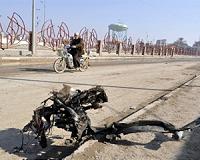| . |  |
. |
Washington (AFP) Feb 3, 2011 The US envoy to Baghdad and the senior US commander in Iraq assured skeptical lawmakers Thursday that the US diplomatic mission there will be well protected after US troops withdraw in late 2011. A private security force some 5,500 strong will protect the large US diplomatic presence in Iraq, US Ambassador James Jeffrey told members of the Senate Armed Services Committee. Jeffrey and Lieutenant General Lloyd Austin, the commander of US military forces in Iraq, said they were confident that the force was adequate, and that Iraq will remain stable once US troops have departed. Both also said they were confident Iraq's US-trained military and police could maintain order once US troops exit. Iraqi security forces "have a good capability" to confront Shiite extremist groups and Al-Qaeda in Iraq, Austin said. Republican Senator John McCain however was not convinced. "I'm deeply concerned about this issue of complete US withdrawal," said McCain, a strong supporter of the 2007-2008 military "surge" in Iraq. McCain questioned the Iraqi military's capacity to use high-tech weapons to pinpoint targets and avoid unnecessary civilian deaths, and its ability to build an air force without US help. McCain also said he was was "very concerned" about radical Shiite cleric Moqtada al-Sadr and his close ties with Iran. The fiery Sadr gained widespread popularity among Shiites in the months after the 2003 US-led invasion, and his Mahdi Army militia battled US and Iraqi government forces in several bloody confrontations. Sadr suspended Mahdi Army activities in August 2008, after major US-supported Iraqi assaults on its strongholds in Baghdad and southern Iraq. Sadr came to Iraq in early January after four years of self-imposed exile in Iran, but returned to Iran after just two weeks. Austin and Jeffrey also said they had no indication the Iraqis want the US military to remain beyond 2012 -- shattering a long-held assumption in official Washington. Republican senator Lindsey Graham was skeptical about the strength of a private protection force. "Would it make sense financially, security-wise, to have a military footprint left behind, if the Iraqis request, to continue to provide security for US State Department officials and others?" he asked. Austin insisted the private security force would be "adequate." Starting in 2012, the US presence in Iraq will consist of up to 20,000 civilians at sites that include two embassy branches, two consulates, and three police training centers. The figures includes armed private security personnel, support staff and diplomats. Currently there are 2,700 armed security contractors in Iraq, Jeffrey told the senators. Austin said US military advisers and trainers would stay to support the Iraqi military with US-made equipment such as M1A1 tanks, military aircraft and patrol ships. He did not give a figure, but said they would not include combat troops. Just 50,000 US troops are currently in Iraq, down from a peak of more than 170,000 and ahead of the full withdrawal in late 2011. "We face a critical moment now in Iraq, where we'll either... finish the job and build upon the sacrifices made, or we will risk core US national security interests," Jeffrey told the senators. He described it as "a historic opportunity and a critical window to help Iraq emerge as a strategic partner and a force for stability and moderation in a troubled region." The government of then-president George W. Bush agreed to the withdrawal terms with the administration of Prime Minister Nuri al-Maliki in November 2008.
Share This Article With Planet Earth
Related Links Iraq: The first technology war of the 21st century
 Twin attacks rock west Iraq, 12 dead nationwide
Twin attacks rock west Iraq, 12 dead nationwideRamadi, Iraq (AFP) Feb 3, 2011 A car bomb followed by a suicide attack on Thursday in the western Iraqi city of Ramadi killed at least eight people, including five policemen, as part of nationwide violence that left 12 dead. The blasts came just days after figures showed more people died in violence in January than any of the previous three months, shattering the relative calm that followed Prime Minister Nuri al-Maliki's ... read more |
|
| The content herein, unless otherwise known to be public domain, are Copyright 1995-2010 - SpaceDaily. AFP and UPI Wire Stories are copyright Agence France-Presse and United Press International. ESA Portal Reports are copyright European Space Agency. All NASA sourced material is public domain. Additional copyrights may apply in whole or part to other bona fide parties. Advertising does not imply endorsement,agreement or approval of any opinions, statements or information provided by SpaceDaily on any Web page published or hosted by SpaceDaily. Privacy Statement |